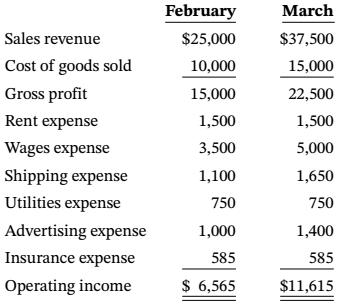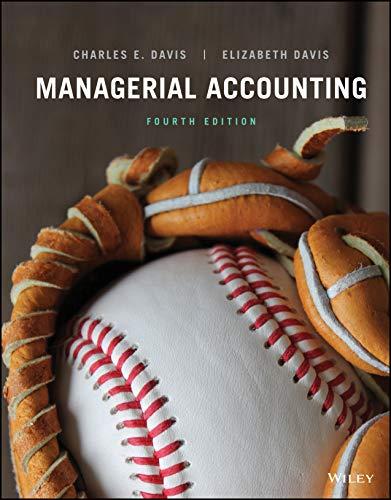Ill never understand this accounting stuff, Blake Dunn yelled, waving the income statement he had just received
Question:
“I’ll never understand this accounting stuff,” Blake Dunn yelled, waving the income statement he had just received from his accountant in the morning mail. “Last month, we sold 2,000 stuffed State University mascots and earned $6,565 in operating income. This month, when we sold 3,000 I thought we’d make $9,848. But this income statement shows an operating income of $11,615! How can I ever make plans if I can’t predict my income? I’m going to give Janice one last chance to explain this to me,” he declared as he picked up the phone to call Janice Miller, his accountant.
“Will you try to explain this operating income thing to me one more time?” Blake asked Janice. “After I saw last month’s income statement, I thought each mascot we sold generated $3.28 in net income; now this month, each one generates $3.87! There was no change in the cost we paid for each mascot, so I don’t understand how this happened. If I had known I was going to have $11,615 in operating income, I would have looked more seriously at adding to our product line.”
Taking a deep breath, Janice replied, “Sure, Blake. I’d be happy to explain how you made so much more operating income than you were expecting.”
Required
a. Assume Janice’s role. Explain to Blake why his use of operating income per mascot was in error.
b. Using the following income statements, prepare a contribution margin income statement for March.
c. Blake plans to sell 1,500 stuffed mascots next month. How much operating income can Blake expect to earn next month if he realizes his planned sales?
d. Blake wasn’t happy with the projected income statement you showed him for a sales level of 1,500 stuffed mascots. He wants to know how many stuffed mascots he will need to sell to earn $5,555 in operating income. As a safety net, he also wants to know how many stuffed mascots he will need to sell to break even.
e. Blake is evaluating two options to increase the number of mascots sold next month. First, he believes he can increase sales by advertising in the university newspaper. Blake can purchase a package of 12 ads over the next month for a total of $1,500. He believes the ads will increase the number of stuffed mascots sold from 1,500 to 2,200. A second option would be to reduce the selling price. Blake believes a 15% decrease in the price will result in 2,400 mascots sold. Which plan should Blake implement? At what level of sales would he be indifferent between the two plans (i.e., at what level of sales do the two plans generate the same operating income)? Round all amounts to two decimal places.
f. Just after Blake completed an income projection for 2,200 stuffed mascots, his supplier called to inform him of a 10% increase in cost of goods sold, effective immediately. Blake knows that he cannot pass the entire increase on to his customers, but thinks he can pass on half of the 10% increase while suffering only a 10% decrease in units sold. Should Blake respond to the increase in cost of goods sold with an increase in price? Round all amounts to two decimal places.
g. Refer back to the original information. Blake has decided to add stadium blankets to his product line. He has found a supplier who will provide the blankets for $32, and he plans to sell them for $60. All other variable costs currently incurred for selling mascots will be incurred for selling blankets at the same rate. Additional fixed costs of $125 per month will be incurred. He believes he can sell one blanket for every four stuffed mascots. How many blankets and stuffed mascots will Blake need to sell each month in order to break even? Round all amounts to two decimal places.
Step by Step Answer:






